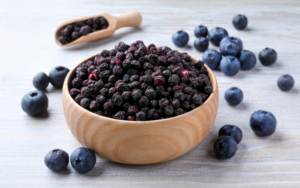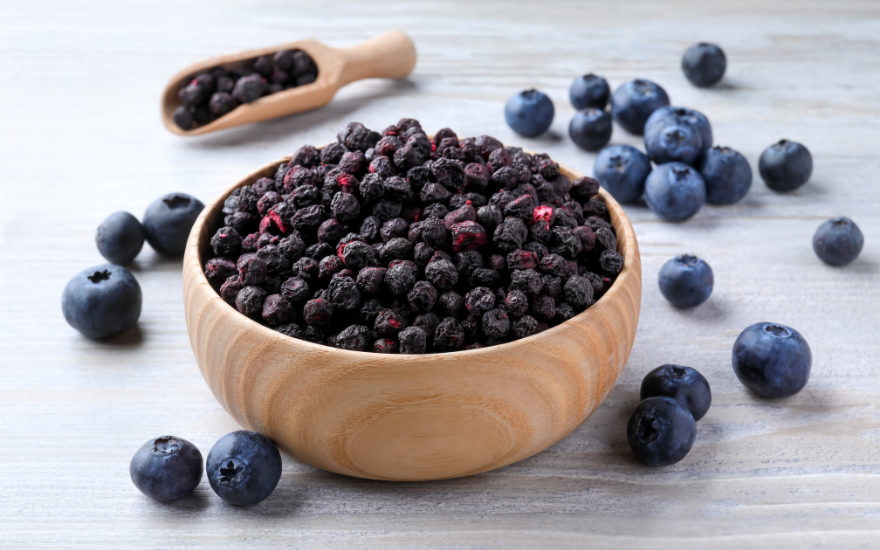Dehydrated blueberries are a versatile and convenient alternative to fresh blueberries. By removing moisture through the process of dehydration, these tiny fruits are transformed into a shelf-stable form that retains much of the nutritional value and flavor. Not only are dehydrated blueberries excellent for snacking, they can also be incorporated into a variety of recipes, from baked goods to salads, offering a concentrated burst of blueberry taste.

The dehydration process is meticulous and requires careful temperature control to ensure that the blueberries dry uniformly without compromising their nutritional integrity or taste. Once dehydrated, blueberries become less perishable and more durable for long-term storage, making them an ideal pantry staple. However, you must store them properly to maintain their quality and extend their shelf life.
Key Takeaways
- Dehydrated blueberries maintain nutritional value and concentrated taste.
- Proper dehydration and storage are crucial for quality preservation.
- They integrate well into diverse culinary applications.
Understanding Dehydrated Blueberries
Dehydrated blueberries are a versatile and nutritious snack, rich in natural sugars and essential nutrients, with a variety of health benefits. Through the process of dehydration, the moisture is removed, making them a convenient, lightweight, and non-perishable food option.
What Are Dehydrated Blueberries?
Dehydrated blueberries are whole blueberries that have had the majority of their water content removed. This drying process is typically done using a dehydrator, oven, or by sun-drying. The end result is a shrunken, concentrated fruit that retains much of the nutritional value of fresh blueberries but in a much smaller, more portable form.
Nutritional Profile
The nutritional value of dehydrated blueberries is impressive. They retain most of their original vitamins and minerals, albeit in a condensed form. Dehydrated blueberries are a good source of dietary fiber, vitamin C, vitamin K, and antioxidants.
- Dietary Fiber: Promotes digestive health
- Vitamin C: Necessary for the growth, development, and repair of all body tissues
- Vitamin K: Essential for blood clotting and bone health
- Antioxidants: Help fight oxidative stress in the body
Benefits for Health and Snacking
I find dehydrated blueberries to be not only convenient but also beneficial for health and snacking. They offer a healthy alternative to sugary snacks and are especially handy for on-the-go eating, camping, or as an addition to meals. The antioxidants present in blueberries have been studied for their potential to improve brain function and help reduce the risk of chronic diseases such as heart disease. Moreover, their long shelf life makes them a staple in my pantry for adding to cereals or using in baking recipes. Their sweet, concentrated flavor boosts the taste profile of various dishes and serves as a handy, nutritious option for snacking throughout the day.
The Dehydration Process
In my experience, the key to excellent dehydrated blueberries lies in careful preparation, the right equipment, and precise timing. I’ll guide you through the stages of dehydration with specific tips on temperature and texture, ensuring your blueberries retain their flavor and longevity.
Preparing Fresh Blueberries
Before I start dehydrating, I ensure my blueberries are clean and ready for the process. I wash them under cold running water and pat them dry. Some blueberries may have tough skins, so I might prick each one with a needle to aid dehydration. If the skins are exceptionally thick, a quick blanch of 25-30 seconds in boiling water will soften them and speed up drying time.
Dehydrators vs. Ovens
For dehydration, I prefer using a dehydrator because it’s designed to maintain a constant temperature with adequate air flow. I spread the blueberries out on mesh trays to ensure they dry evenly. Although an oven can be used too, it’s vital to keep the temperature low and the door slightly open to allow moisture to escape, which might lead to less consistent results compared to a dehydrator.
Timing and Temperature Tips
I’ve found that the optimal temperature for dehydrating blueberries is between 135°F and 140°F. The dehydration process usually takes about 8-12 hours in a dehydrator. However, if using an oven, it might take slightly longer due to the less consistent temperature and air flow. I always ensure the berries are spread out in a single layer and give them space for proper air circulation.
Checking Dryness and Texture
The final step is checking for dryness. I know that properly dehydrated blueberries are done when they feel leathery but not hard. They shouldn’t have any visible moisture and should be chewy, like a raisin. Once they’ve cooled, I make sure to store them in an airtight container to preserve their texture and extend shelf life.
Storing Dehydrated Blueberries
I know how important it is to store your dehydrated blueberries properly in order to maintain their quality and extend their shelf life. In this section, I will discuss the ideal storage conditions for your blueberries and how you can best preserve them.
Ideal Storage Conditions
For optimum preservation, I store my dehydrated blueberries in airtight containers. This prevents moisture and air from getting in, which can degrade the fruit. The best places to keep them are in cool, dark areas away from direct sunlight. If I live in a particularly hot and humid climate, I sometimes store my airtight containers in the refrigerator or freezer to keep the blueberries dry and to stave off potential spoilage.
Shelf Life and Preservation
The shelf life of dehydrated blueberries can vary depending on how they are stored. Generally, if I store them in airtight containers at room temperature in a dark place, they can last from six months up to a year. In my experience, if I choose to refrigerate or freeze them, they can last even longer—sometimes up to 18 months without significant loss of flavor or texture. Remember, to ensure your blueberries remain at their best, check them periodically for any signs of moisture or spoilage.
Creative Uses of Dehydrated Blueberries
Dehydrated blueberries can revolutionize mundane recipes with their intense flavor and versatility, easily integrating into various culinary applications.
In Baking and Cooking
In the realm of baking, I find that dehydrated blueberries add a chewy texture and concentrated berry flavor to classic pastries. They are ideal for folding into muffin batter, scone dough, and pancake mixes. For those who enjoy making bread, adding these berries to a loaf can create a delightful contrast between savory and sweet.
Trail Mix and Granola Bars
I always advise friends to consider dehydrated blueberries for their homemade trail mix and granola bars. Their light weight and rich taste make them perfect for on-the-go snacking. You can combine them with nuts, seeds, and chocolate chips for a satisfying trail mix or mix them into granola bar ingredients to boost the nutritional value with their antioxidants.
Unique Recipe Ideas
Experimenting with dehydrated blueberries opens the door to unique recipe ideas. I sometimes enhance savory dishes like salads or couscous with a handful of these berries for an unexpected burst of flavor. Incorporating them into a vinaigrette or sauce can also impart a hint of sweetness and depth. For dessert, mixing them into ice cream or yogurt creates a textural surprise that’s always a hit.
Discover a plethora of creative ideas and recipes for using dehydrated blueberries on Dehydrated Gourmand.
Potential Risks and Considerations

When dehydrating blueberries, it’s important to consider the potential changes in nutritional content. The dehydration process can concentrate sugars, resulting in higher sugar content per volume compared to fresh blueberries. Individuals with diabetes or those monitoring their sugar intake should be aware of this and consume in moderation.
Dehydrated blueberries retain most of their antioxidants, although the drying process may slightly alter some beneficial compounds, potentially affecting their antioxidant activity. My understanding is that treatments such as pulsed electric fields can influence the biochemical degradation of these compounds during dehydration.
In terms of allergens, while blueberries themselves are not a common allergen, cross-contamination can occur during processing. As such, those with severe allergies should ensure the dehydrated product is free from contamination with known allergens.
Regarding dietary cautions, it’s essential to account for the caloric density of dried fruits. Dehydrated blueberries can be an easy snack but are also easy to overeat. Portion control is crucial to prevent excessive caloric intake, particularly for individuals who are weight conscious.
I recommend checking products for added sugars or preservatives that can increase caloric content and pose additional health risks. Natural dehydration without additives is preferable for maintaining a healthier profile. Keep these considerations in mind to enjoy dehydrated blueberries as part of a balanced diet.
Frequently Asked Questions
In this section, I’ll address some common inquiries about using dehydrated blueberries, from preparation techniques to their benefits and proper storage methods.
What is the best method to dehydrate blueberries in an air fryer?
To dehydrate blueberries in an air fryer, set the air fryer to a low temperature, ideally around 135°F. This will gently remove moisture without cooking the berries. Dehydrating them will take approximately 8-10 hours. Make sure to shake the basket occasionally for even drying.
Can you provide recipes that incorporate dehydrated blueberries?
Dehydrated blueberries can be a delicious addition to various recipes. They are excellent when mixed into granola or oatmeal. You can also sprinkle them over salads for a touch of sweetness. Lastly, use them in baking to enhance bread, muffins, and pancakes.
How can I make dehydrated blueberry powder at home?
To make blueberry powder, dehydrate the blueberries until they are completely dry and brittle. Then, grind them into a fine powder using a food processor, spice grinder, or high-power blender. It’s a fantastic way to concentrate the flavor and color in a versatile form.
What are the benefits of adding dehydrated blueberries to my diet?
Dehydrated blueberries are nutrient-dense and rich in antioxidants, vitamins, and fiber. Including them in your diet allows you to enjoy the benefits of fresh blueberries in a convenient, shelf-stable form. This form is perfect for snacking, cooking, and baking.
Is it necessary to blanch blueberries before the dehydration process?
Blanching blueberries isn’t strictly necessary, but doing so can help the skins crack. This allows for faster and more uniform drying. Simply blanch them for 30 seconds in boiling water before dehydrating for excellent results.
How long can I store dehydrated blueberries, and how should they be stored?
Dehydrated blueberries can be stored for up to a year. Just keep them in an airtight container in a cool, dry place. To ensure they stay fresh and last long, make sure they are completely dry before storing.

*We may earn a commission for purchases made using our links. Please see our disclosure to learn more.



